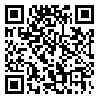Volume 17, Issue 2 (2014)
mjms 2014, 17(2): 49-57 |
Back to browse issues page
Download citation:
BibTeX | RIS | EndNote | Medlars | ProCite | Reference Manager | RefWorks
Send citation to:



BibTeX | RIS | EndNote | Medlars | ProCite | Reference Manager | RefWorks
Send citation to:
Sobhanimonfared F, Bamdad T, Azita Sadigh Z, Razavi Niko H, Choobin H. Cellular Immune Response Following Neonatal Mice Immunization with Vesicular Stomatitis Virus. mjms 2014; 17 (2) :49-57
URL: http://mjms.modares.ac.ir/article-30-637-en.html
URL: http://mjms.modares.ac.ir/article-30-637-en.html
Fatemeh Sobhanimonfared1  , Taravat Bamdad
, Taravat Bamdad  1, Zohreh Azita Sadigh2
1, Zohreh Azita Sadigh2  , Hadi Razavi Niko1
, Hadi Razavi Niko1  , Hamzeh Choobin1
, Hamzeh Choobin1 
 , Taravat Bamdad
, Taravat Bamdad  1, Zohreh Azita Sadigh2
1, Zohreh Azita Sadigh2  , Hadi Razavi Niko1
, Hadi Razavi Niko1  , Hamzeh Choobin1
, Hamzeh Choobin1 
1- Department of Virology, Faculty of Medical Science, Tarbiat Modares University, Tehran, Iran
2- Head of M.M.R. Vaccine Department, Razi Vaccine & Serum Research Institute, Karaj, Iran
2- Head of M.M.R. Vaccine Department, Razi Vaccine & Serum Research Institute, Karaj, Iran
Abstract: (9786 Views)
Objective: Infectious microorganisms are major sources of illness and death worldwide, and the leading cause of death in neonates. Effective vaccination of this age group is of particular importance. The lack of a response and greater susceptibility to tolerance are two major features that limit the effectiveness of vaccines in neonates. In this study we compare the cellular immune response generated following antigen injections at different times of life in newborn mice to that of adult mice. Methods: Adult and different age neonate mice were vaccinated with vesicular stomatitis virus (VSV). One week after the last injection, cellular immunity was assayed on spleen cells that targeted EL4 infected cells using lactate dehydrogenase cytotoxicity assay. Results: Antigen injection induced a decreased immune response in newborn mice compared with mice that had been immunized with subsequent injections. In the adult group, due to the evolution of the immune system, we observed a stronger immune response. Conclusion: Immunization of newborn mice may induce a reduced response when compared to adult vaccinations. However this can be corrected by the administration of additional booster doses.
Keywords: Vesicular Stomatitis Virus (VSV), Immunization, Tolerance, Neonate Mice, Lactate Dehydrogenase Assay
Article Type: Original Manuscipt |
Subject:
Immunology|Vaccine|Virology
Received: 2014/05/19 | Accepted: 2014/06/14
Received: 2014/05/19 | Accepted: 2014/06/14
| Rights and permissions | |
 |
This work is licensed under a Creative Commons Attribution-NonCommercial 4.0 International License. |






